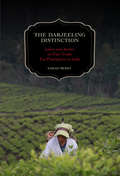- Table View
- List View
The Dangers of Ritual: Between Early Medieval Texts and Social Scientific Theory
by Philippe BucCentral to current understandings of medieval history is the concept of political ritual, encompassing events from coronations to funerals, entries into cities, civic games, banquets, hunting, acts of submission or commendation, and more. ''Ritual?'' asks Philippe Buc. In The Dangers of Ritual he boldly argues that the concept shouldn't be so central after all. Modern-day scholars, gently seduced by twentieth-century theories of ritual, often misinterpret medieval documents that ostensibly describe such events, in part because they fail to appreciate the intentions behind them.The book begins with four case studies whose arrangement--backward from texts on tenth-century kingship to fourth-century representations of Christian martyrdom--allows for the line of development to be peeled back layer by layer. It then turns to an analysis of the formation of the intellectual traditions that contemporary historians have employed to interpret medieval documents. Tracing the emergence of the concept of ritual from the Reformation to the mid-twentieth century, Buc highlights the continuities yet also the profound transformations between the early medieval understandings and our own, social-scientific models.Medieval historians will find this book an indispensable resource for its insights into methodological issues crucial to their discipline. As Buc demonstrates, only rigorous attention to the contexts within which authors worked can allow us to reconstruct from medieval documents how ''rituals'' might have functioned. Ultimately, he argues, too swift an application of contemporary models to highly complex textual artifacts blinds us to the specificities of early medieval European political culture.
The Daniel Wilsons in France, 1819–1919: Industry, the Arts, the Press, Châteaux, the Elysée Palace, and Scandal
by Michael B. PalmerScottish engineer Daniel Wilson (1790–1849) helped launch the industrial revolution in France and acquired a major art collection. His daughter, Marguerite (1836–1902), restored the château de Chenonceau, near the Loire Valley. His son, Daniel (1840–1919), close to Marguerite, became an MP, founded a newspaper chain, rose to become a leading republican politician, and married the daughter of President of the Republic Jules Grévy. The younger Daniel Wilson’s business activities and news strategies offended many and prompted his involvement in a scandal (the sale of the Legion of Honour decoration) that led to his downfall and that of President Grévy. Wilson’s name became and remains synonymous with political corruption. This book is the first to examine the nexus of political and press connections in early republican France from his viewpoint. The struggle for press freedom since the 1789 Revolution culminating in the 1881 Press Law is assessed by considering the stance of Wilson, Grévy, and the leading press magnate Emile de Girardin and other press tycoons. The flamboyant Marguerite, who hosted Gustave Flaubert in Chenonceau and journeyed to India, colours the saga.
The Danish Secret to Happy Kids: How the Viking Way of Raising Children Makes Them Happier, Healthier, and More Independent
by Helen Russell"Smart, witty and packed with surprising facts about life in the Nordics, The Danish Secret to Happy Kids is a foolproof roadmap to raising kids the Viking way. If you enjoy Helen Russell's signature self-deprecating sense of humor and captivating storytelling, you're in for a real treat." —Linda Åkeson McGurk, author of There's No Such Thing as Bad Weather and The Open-Air LifeWhat do Vikings know about raising children? Turns out, quite a bit. After a decade of living in Denmark, and raising her three kids there, Helen Russell noticed that Nordic kids (or mini-Vikings) are different from children raised in other parts of the world. They eat differently. They learn differently. They play, dress, and even sleep differently. They run, jump, climb, fall and get up again, out in nature, for hours a day. It's cold and wet and uncomfortable—often. But they cope. Even though the weather's terrible and it's dark October through March. And then they grow up to be some of the happiest adults on the planet. So her question was: how?In The Danish Secret to Happy Kids, Russell dives deep into the parenting culture of Denmark and the other Nordic nations, from parental leave policies to school structure to screen time, uncovering surprising strategies and customs that lead to largely happy, well-adjusted humans over the long term. This fascinating peek behind the cultural curtain allows readers to marvel over infants comfortably sleeping outside in chilly temperatures, school-age kids wielding axes in the woods, and teenagers spending a year or two at efterskole, a special boarding school designed to prepare adolescents for independent life in the real world—a concept that is beginning to be adopted in other nations.Refreshingly funny and unfailingly optimistic about the new generation of humans growing up in the world right now, The Danish Secret to Happy Kids is a heart-warming love letter to Russell's adopted homeland, a comforting armchair travel read, and proof that we could all use a bit more Viking in our everyday lives.
The Danish Way of Parenting: What the Happiest People in the World Know About Raising Confident, Capable Kids
by Jessica Joelle Alexander Iben Dissing Sandahl'A shining alternative to high-stress modern parenting, and families from New Delhi to New York will shout with joy' Heather Shumaker, author of It's OK Not to Share and It's OK to Go Up the SlideDISCOVER THE PARENTING SECRETS OF THE HAPPIEST PEOPLE IN THE WORLDWhat makes Denmark the happiest country in the world -- and how do Danish parents raise happy, confident, successful kids, year after year? This upbeat and practical guide reveals the six essential principles that have been working for parents in Denmark for decades:- Play: essential for development and well-being- Authenticity: fosters trust and an 'inner compass'- Reframing: helps kids cope with setbacks and look on the bright side- Empathy: allows us to act with kindness towards others- No ultimatums: no power struggles or resentment- Togetherness: a way to celebrate family time, on special occasions and every dayA revealing and fresh take on parenting advice, The Danish Way of Parenting will help parents from all walks of life raise the happiest, most well-adjusted kids in the world.
The Danish Way of Parenting: What the Happiest People in the World Know About Raising Confident, Capable Kids
by Jessica Joelle Alexander Iben Dissing Sandahl'A shining alternative to high-stress modern parenting, and families from New Delhi to New York will shout with joy' Heather Shumaker, author of It's OK Not to Share and It's OK to Go Up the SlideDISCOVER THE PARENTING SECRETS OF THE HAPPIEST PEOPLE IN THE WORLDWhat makes Denmark the happiest country in the world -- and how do Danish parents raise happy, confident, successful kids, year after year? This upbeat and practical guide reveals the six essential principles that have been working for parents in Denmark for decades:- Play: essential for development and well-being- Authenticity: fosters trust and an 'inner compass'- Reframing: helps kids cope with setbacks and look on the bright side- Empathy: allows us to act with kindness towards others- No ultimatums: no power struggles or resentment- Togetherness: a way to celebrate family time, on special occasions and every dayA revealing and fresh take on parenting advice, The Danish Way of Parenting will help parents from all walks of life raise the happiest, most well-adjusted kids in the world.
The Dao Companion to Japanese Buddhist Philosophy (Dao Companions to Chinese Philosophy #8)
by Gereon KopfThe volume introduces the central themes in and the main figures of Japanese Buddhist philosophy. It will have two sections, one that discusses general topics relevant to Japanese Buddhist philosophy and one that reads the work of the main Japanese Buddhist philosophers in the context of comparative philosophy. It combines basic information with cutting edge scholarship considering recent publications in Japanese, Chinese, English, and other European languages. As such, it will be an invaluable tool for professors teaching courses in Asian and global philosophy, undergraduate and graduate students, as well as the people generally interested in philosophy and/or Buddhism.
The Darfur Conflict: Geography or Institutions? (Routledge African Studies)
by Osman SulimanAlthough it is often simplified as an "ethnic conflict" in popular media, the current crisis in Darfur can only be superficially defined across ethnic lines. Any long-term solution to the conflict must also address the underlying social and environmental influences such as changing resource dynamics, expanding poverty, lack of infrastructure, and political corruption, which have brought the crisis to a head. This project diverges from previous studies by examining how the dynamic interaction between the environment, local governance, and national policy in Sudan has resulted in the Darfur crisis. It demonstrates how ecological degradation and the breakdown of community governance have destabilized the region, and how corruption and incompetence at the national level have culminated in the current crisis. Analyzing the interplay of these factors will yield valuable insights as to how a concerned international community can both end the tragic genocide and address the underlying injustices that engendered it. The analysis presented will be informative and accessible to a wide readership of students, academics, and concerned citizens.
The Darjeeling Distinction
by Sarah BeskyNestled in the Himalayan foothills of Northeast India, Darjeeling is synonymous with some of the finest and most expensive tea in the world. It is also home to a violent movement for regional autonomy that, like the tea industry, dates back to the days of colonial rule. In this nuanced ethnography, Sarah Besky narrates the lives of tea workers in Darjeeling. She explores how notions of fairness, value, and justice shifted with the rise of fair-trade practices and postcolonial separatist politics in the region. This is the first book to explore how fair-trade operates in the context of large-scale plantations. Readers in a variety of disciplines--anthropology, sociology, geography, environmental studies, and food studies--will gain a critical perspective on how plantation life is changing as Darjeeling struggles to reinvent its signature commodity for twenty-first-century consumers. The Darjeeling Distinction challenges fair-trade policy and practice, exposing how trade initiatives often fail to consider the larger environmental, historical, and sociopolitical forces that shape the lives of the people they intended to support.
The Dark
by Sergio Chejfec Heather ClearyOpening with the presently shut-in narrator reminiscing about a past relationship with Delia, a young factory worker, The Dark employs Chejfec's signature style with an emphasis on the geography and motion of the mind, to recount the time the narrator spent with this multifaceted, yet somewhat absent, woman. The Dark is the most captivating example of Chejfec's unique narrative approach.
The Dark Age of Greece: An Archeological Survey of the Eleventh to the Eighth Centuries B.C.
by A.M. SnodgrassThis is a classic work of archaeology by one of the premier figures in the field. First published in 1971, A.M. Snodgrass' The Dark Age if Greece is the most comprehensive and coherent account available of this period of ancient Greece.
The Dark Eclipse: Reflections on Suicide and Absence
by A. W. BarnesThe Dark Eclipse is a book of personal essays in which author A.W. Barnes seeks to come to terms with the suicide of his older brother, Mike. Using source documentation—police report, autopsy, suicide note, and death certificate—the essays explore Barnes’ relationship with Mike and their status as gay brothers raised in a large conservative family in the Midwest. In addition, the narrative traces the brothers’ difficult relationship with their father, a man who once studied to be a Trappist monk before marrying and fathering eight children. Because of their shared sexual orientation, Andrew hoped he and Mike would be close, but their relationship was as fraught as the author’s relationship with his other brothers and father. While the rest of the family seems to have forgotten about Mike, who died in 1993, Barnes has not been able to let him go. This book is his attempt to do so. Published by Bucknell University Press. Distributed worldwide by Rutgers University Press.
The Dark Lady: Mad Passions Book 1 (Mad Passions)
by Maire ClaremontThe first thrilling and passionate novel of mad passions and scandalous secrets for fans of Grace Burrowes, Tessa Dare, Elizabeth Hoyt and Sarah MacLean.Lord Ian Blake has returned from India a broken man. Years ago, he pledged to Lady Eva Carin - his childhood companion and first love - that he would bring her husband back alive. His failure haunts him. But even his jaded soul can't anticipate the shocking sight of beautiful, independent Eva confined to a madhouse. Locked in an asylum, forgotten by society, Eva is adrift in both body and mind. For Ian to break her free, they must cross a powerful enemy - and prove her sanity to England's unforgiving aristocracy. But the biggest danger of all may come when the secrets of Eva's tragic past are finally unlocked...For more deliciously dark Victorian romance, try all the titles in the Mad Passions series: The Dark Lady, Lady In Red, A Lady Undone and The Dark Affair, and check out Maire's alter-ego Eva Devon for sexy and laugh-out-loud funny Regencies.
The Dark Landscape of Modern Fiction
by Patrick ReillyThis title was first published in 2003. This text explores the "dark, pessimistic truth that pervades the pages of modern texts", setting a theme of Dante's "Inferno" against the work of modern authors including Dostoyevsky, Hardy, Conrad, Wharton, Kafka, Camus, Waugh and Flannery O'Connor. The author's thesis is that these writers exhibit a hostility towards the reader, an anger that the reader should continue to be so deludedly happy when the writer has become so mortifyingly enlightened. At its most characteristic, Reilly demonstrates, modern fiction seems to achieve a savage satisfaction in inflicting this pain, to an extent that could be described as sadistic. Reilly traces what he calls this "punitive spirit" to a character in the "Inferno", Vanni Fucci, who suffering himself does his best to make Dante suffer too. Through the study he uses the "Inferno" as a guide to the prevailing attitudes in modern fiction, revealing a parallel between the prohibition of pity within the medieval poem and in the pages of modern texts.
The Dark Mafia: Organized Crime in the Age of the Internet
by Marcel Danesi Antonio NicasoThis book explores how organized crime has adapted and evolved in sync with ever-expanding technologies to update its popular image and to conduct its covert operations. It shows how organized crime operates in dark virtual spaces and how it can now form a dynamic interactive system with legitimate online spaces, solidifying its criminal exploits and resources, and making them attractive to a new generation of computer users. Focusing on Italian Mafias, Russian and Georgian criminal groups and drug cartels, and Asian crime syndicates such as Yakuza and Triads, this book aims to describe and explain the reasons behind the continuity of online and offline crime, taking into consideration whether or not internet culture has radically changed the way we perceive organized crime and if so how, and thus how the shift in popular imagery that the internet has brought about affects its actual illegal activities. We also consider how organized crime has shifted its locale from the physical to the virtual, how cybercrime has allowed criminal organizations to adapt and reinvent themselves, and how the police now use technology against organized crime. To better understand the new generation of criminals, it is becoming increasingly urgent to understand the latest technologies and how criminals utilize them. The Dark Mafia is an engaging and accessible introduction to understanding virtual organized crime. It will appeal to students and scholars of criminology, sociology, policing, and all those interested in the digital age of organized crime.
The Dark Shadows Almanac
by Kathryn Leigh Scott Jim Pierson David SelbyTHE DARK SHADOWS ALMANAC: Millenium Edition is a colorful, picture-packed tribute to the legendary 1966 - 1971 Gothic ABC-TV daytime series Dark Shadows, that starred Jonathan Frid as vampire Barnabas Collins. THE DARK SHADOWS ALMANAC was originally published in 1995 to celebrate the 30th anniversary of the show every kid "ran home from school to watch,"The Millenium Edition has been updated, and contains 16 pages of additional text and photographs. Edited by series archivist Jim Pierson and Dark Shadows actress Kathryn Leigh Scott (Maggie Evans and Josette duPrés), this book overflows with fascinating facts, anecdotes and trivia about Dark Shadows, along with dozens of never-before-published photographs. THE DARK SHADOWS ALMANAC: Millenium Edition includes a Foreword by actor David Selby, who played Quentin Collins on the series. Lara Parker, who portrayed Angelique, has written a sparkling salute to the fans, who have kept the series alive and airing continuously for three decades. Associate Producer George DiCenzo and Scenic Designer Sy Tomashoff also provide fascinating, often hilarious behind-the-scenes insights as to how the show was conceived and produced. Other contributors include Louis Edmonds, Marie Wallace, Donna Wandrey, Dennis Patrick and Dark Shadows fans themselves, who recount their youthful, unforgettable experiences visiting the Manhattan TV studio while the series was in production. Additional features of THE DARK SHADOWS ALMANAC: Millenium Edition are a complete list of cast and characters, program history, storyline and production details, and a tribute to Dark Shadows creator and executive producer Dan Curtis. THE DARK SHADOWS ALMANAC: Millenium Edition is the fourth in a series of Dark Shadows volumes published by Pomegranate Press. In 1986, the company issued Kathryn Leigh Scott's My Scrapbook Memories of Dark Shadows, followed by The Dark Shadows Companion in 1990. Dark Shadows Resurrected, devoted to the 1991 revival series, was published in 1992.
The Dark Shadows Companion
by Kathryn Leigh Scott Jonathan FridThe timeless magic of the Gothic cult series Dark Shadows comes alive in Kathryn Leigh Scott's Dark Shadows Companion, as members of the original cast of Dark Shadows reunite to recall great moments and personal memories of this enduring classic. With a Foreword by Jonathan Frid (vampire Barnabas Collins), this Silver Anniversary treasure trove features rare color and black & white photographs, a complete history of the original Dark Shadows series, including a synopsis of all 1,225 episodes.
The Dark Side of Alice in Wonderland
by Angela YoungmanA unique exploration of the character, the author, and the many transformations of Alice in modern culture—often in edgy and menacing ways. The Dark Side of Alice in Wonderland is the first investigation of the vast range of darker, more threatening aspects of this famous story, and the way Alice has been transformed over time. Although the children&’s story has been in print for over 150 years, the mysteries and rumors surrounding the story and its creator Lewis Carroll have continued to grow. Alice has been transformed—this is the Alice of horror films, Halloween, murder and mystery, spectral ghosts, political satire, mental illnesses, weird feasts, Lolita, Tarot, pornography, and steampunk. The Beatles based famous songs such as &“Lucy in the Sky with Diamonds&” and &“I am the Walrus&” on Alice&’s Adventures in Wonderland, and she has even attracted the attention of world-famous artists including Salvador Dali. The Japanese version of Lolita is so different from that of novelist Vladimir Nabokov—yet both are based on Alice. This is Alice in Wonderland as you have never seen her before: a dark, sometimes menacing, and threatening character. Was Carroll all that he seemed? The stories of his child friends, nude photographs, and sketches affect the way modern audiences look at the writer. Was he just a lonely academic, a closet pedophile, a brilliant puzzle maker—or even Jack the Ripper? For a book that began life as a simple children&’s story, it has resulted in a vast array of dark concepts, ideas, and mysteries. With this book, you can step inside the world of Alice in Wonderland—and discover a dark side you never knew existed.
The Dark Side of Camp Aesthetics: Queer Economies of Dirt, Dust and Patina (Routledge Research in Cultural and Media Studies)
by Ingrid Hotz-Davies Franziska Bergmann Georg Vogt"Camp" is often associated with glamour, surfaces and an ostentatious display of chic, but as these authors argue, there is an underside to it that has often gone unnoticed: camp’s simultaneous investment in dirt, vulgarity, the discarded and rejected, the abject. This book explores how camp challenges and at the same time celebrates what is arguably the single most important and foundational cultural division, that between the dirty and the clean. In refocusing camp as a phenomenon of the dark underside as much as of the glamorous surface, the collection hopes to offer an important contribution to our understanding of the cultural politics and aesthetics of camp.
The Dark Side of Game Play: Controversial Issues in Playful Environments (Routledge Advances in Game Studies)
by Torill Elvira Mortensen Jonas Linderoth Ashley Ml BrownGames allow players to experiment and play with subject positions, values and moral choice. In game worlds players can take on the role of antagonists; they allow us to play with behaviour that would be offensive, illegal or immoral if it happened outside of the game sphere. While contemporary games have always handled certain problematic topics, such as war, disasters, human decay, post-apocalyptic futures, cruelty and betrayal, lately even the most playful of genres are introducing situations in which players are presented with difficult ethical and moral dilemmas. This volume is an investigation of "dark play" in video games, or game play with controversial themes as well as controversial play behaviour. It covers such questions as: Why do some games stir up political controversies? How do games invite, or even push players towards dark play through their design? Where are the boundaries for what can be presented in a games? Are these boundaries different from other media such as film and books, and if so why? What is the allure of dark play and why do players engage in these practices?
The Dark Side of Humanity: The Work of Robert Hertz and its Legacy
by Robert ParkinRobert Parkin's book gives a reading of each of these texts before going on to show their subsequent influence on anthropologists in particular. Hertz's activities as reviewer and phamphleteer are also covered. The introductory biographical chapter drawing on Hertz's surviving papers in the Collège de France, shows his own ambivalence towards his academic career and it also attempts to clarify the circumstances leading up to his apparently gratuitous death in the First World War. Two further chapters attempt to situate his work in the broader context of Durkheimian sociology.
The Dark Side of Podemos?: Carl Schmitt and Contemporary Progressive Populism (Routledge Advances in Sociology)
by Patrick Baert Josh BoothIn 2014 a new progressive party, Podemos, emerged on the Spanish political scene. Within just over two years it had become the country’s third-biggest party, winning a slew of seats in parliament and regularly making headline news. While some see Podemos as the saviour of Spanish democracy, others have accused it of corrosive populism. But what few have noticed is that behind its distinctive rhetoric lies a thinker closely associated with Germany’s Third Reich: Carl Schmitt. Why has an ostensibly progressive and avowedly anti-fascist political party taken up Schmitt’s ideas? The puzzle only deepens when we learn of Schmitt’s links with Francisco Franco’s dictatorship. In The Dark Side of Podemos?, Booth and Baert explain why Schmittian theory resonated with Podemos’ founders. In doing so, the authors position Podemos and the ideas that guide it within the context of recent Spanish history and ongoing politics of memory, revealing a story about how personal and political narratives have combined to produce a formidable political force. This enlightening monograph will appeal to undergraduates and postgraduates, as well as postdoctoral researchers, interested in fields such as Politics, Political Theory and Sociology. It will also be relevant to those curious about contemporary Spanish politics, the nature of populism, the future of the European left, or Carl Schmitt and his links with Spain.
The Dark Side of Samuel Pepys: Society's First Sex Offender
by Geoffrey PimmThis historical biography reveals how the famous diarist of Restoration England used his professional position to act as a sexual predator. Samuel Pepys is popularly known as the founder of the modern navy, a member of the Royal Society and, most of all, as a unique and frank diarist. Less well known is that he was a serial sexual offender by modern standards; a voyeur, a groper, and a rapist. Set against the London society of Charles II&’s restoration, and extensively using Pepys&’ own words, this book concerns his numerous extramarital affairs. It demonstrates how he used his position of power and influence to advance the careers of his subordinates—in return for the sexual favors of their wives. With his own descriptions, translated from the strange mix of languages and the seventeenth-century shorthand he used to camouflage the content, the reader witnesses in graphic detail how Pepys set about achieving his lascivious objectives – on occasion resorting to physical force where persuasion or bribery failed. Whether she be wife, daughter, mother, or humble maidservant, no woman was safe from his rapacious sexual appetite.
The Dark Side of Stand-Up Comedy (Palgrave Studies in Comedy)
by Patrice A. Oppliger Eric ShouseThis book focuses on the “dark side” of stand-up comedy, initially inspired by speculations surrounding the death of comedian Robin Williams. Contributors, those who study humor as well as those who perform comedy, join together to contemplate the paradoxical relationship between tragedy and comedy and expose over-generalizations about comic performers’ troubled childhoods, addictions, and mental illnesses. The book is divided into two sections. First, scholars from a variety of disciplines explore comedians’ onstage performances, their offstage lives, and the relationship between the two. The second half of the book focuses on amateur and lesser-known professional comedians who reveal the struggles they face as they attempt to hone successful comedy acts and likable comic personae. The goal of this collection is to move beyond the hackneyed stereotype of the sad clown in order to reveal how stand-up comedy can transform both personal and collective tragedies by providing catharsis through humor.
The Dark Side of the Crescent Moon: The Islamization of Europe and its Impact on American/Russian Relations
by Georgy GounevThe Dark Side of the Crescent Moon constitutes a historical and political analysis of the growth of radical Islam throughout the world. It shows how the spread of radical Islam in Europe drove the United States and Russia to become allies of necessity, in order to confront a shared danger. Georgy Gounev provides readers with a detailed assessment of the people, countries, and global movements that factor into Islam's mounting threat.From the evolution and history of radical Islam to the role of the United States and Russia in the rise of Islam, the author lays out the factors contributing to this global phenomenon. Taking the reader from Chechnya and Kosovo, to Sudan and Somalia, to Afghanistan and Iraq, Gounev explores the motivations that lurk beneath the surface of active conflict, and extend the threat to the shores of Britain, Russia, and even the United States. He illuminates the vast network that is actively transmitting the political and religious dogma of radical Islam. Casting a cold eye on the theocratic fundamentalism emanating from Iran and Saudi Arabia, Gounev sounds an alarm about a growing threat both outside and inside our borders.
The Dark Side of the Ivory Tower: Campus Crime as a Social Problem
by John J. Sloan III Bonnie S. FisherA cursory reading of the history of U. S. colleges and universities reveals that campus crime has been part of collegiate life since the Colonial Era, yet it was not until the late 1980s that it suddenly became an issue on the public stage. Drawing from numerous mass media and scholarly sources and using a theoretical framework grounded in social constructionism, this text chronicles how four groups of activists - college student advocates, feminists, victims and their families, and public health experts - used a variety of tactics and strategies to convince the public that campus crime posed a new danger to the safety and security of college students and the ivory tower itself, while simultaneously convincing policymakers to take action against the problem. Readers from a range of disciplinary interests will find the book both compelling and valuable to understanding campus crime as a newly constructed social reality.
























